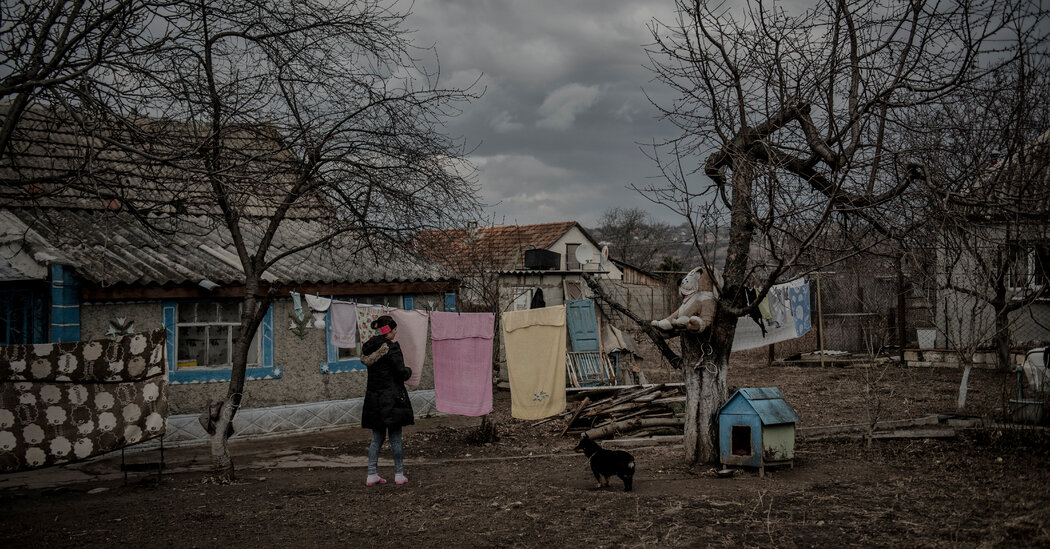
ON THE DNIESTER RIVER — Just eight miles from the Ukrainian border, the mayor of a village in Moldova watched rolling television coverage of the Russian invasion next door. He fiddled with a pen, removing and replacing its lid, staring at the screen as it showed the Russian advance toward Odessa, the nearest big city on the Ukrainian side.
“I can’t stop watching,” Mayor Alexander Nikitenko said. “If they take Odessa, it’s clear they’ll come here next.”
And if the Russians do get this far, Mr. Nikitenko wondered, would they necessarily stop?
Such questions are being asked all across Eastern Europe in former Communist republics like Moldova. The Russian invasion of Ukraine has shattered assumptions about the post-Cold War order, providing clear evidence that President Vladimir V. Putin of Russia sees Europe’s borders as open to being redrawn by force.
A poor country of 2.6 million squeezed between Ukraine and Romania, Moldova is perhaps the most vulnerable. Unlike Poland and the Baltic States, Moldova is not a member of NATO. It is not a member of the European Union either, but submitted a hurried, long-shot application last week, something akin to sending up a flare.
Most problematically, two decades before Russian-speaking separatists carved a chunk out of Ukraine, they did the same thing in Moldova.
In 1992, Moscow-backed separatists took control of a thin 250-mile sliver of land, known as Transnistria, that runs along much of the eastern bank of the Dniester River as well as parts of the western bank.
They also claim pockets of land still controlled by Moldova, including Mr. Nikitenko’s village, Varnita.
Transnistria has never been recognized internationally — not even by Russia. But Russia keeps 1,500 soldiers there, nominally to keep the peace and guard a huge Soviet-era munitions cache.
If Russian forces advance to the Moldovan border, some Moldovans fear that Russia will soon either recognize Transnistria, much as it did with Ukraine’s self-declared separatist republics — giving Moscow a similar pretext to officially occupy it — and perhaps even later absorb it into either a pro-Russian Ukraine or Russia itself.
Arrows on a map of Ukraine presented at a televised briefing about the Russian invasion last Tuesday by the Belarusian president, Aleksandr G. Lukashenko, suggested that Russian troops in Ukraine planned to enter Transnistria after capturing Odessa. The Belarusian ambassador to Moldova later apologized for Mr. Lukashenko’s map, claiming it was a mistake.
Within the Moldovan government, senior officials have discreetly discussed concerns that Russia might occupy Moldova entirely, two Moldovan officials said on condition of anonymity.
“People are scared, literally scared,” said Alexandru Flenchea, an analyst and former deputy prime minister of Moldova, who oversaw efforts to reintegrate Transnistria. “Many are considering emigration, before they might themselves become refugees.”
No European can feel safe today, particularly after Mr. Putin instructed his army to ready Russia’s nuclear arsenal, Mr. Flenchea said.
“But of all countries, except the aggressors themselves, Moldova is the country that is closest to the military action,” Mr. Flenchea added.
Though small and impoverished, Moldova has historically been a bellwether for power dynamics in Eastern Europe. In little more than two centuries, the country has formed part of the Ottoman Empire, the Russian Empire, the Kingdom of Romania and the Soviet Union.
Along the Dniester River, that complex history, coupled with the combustive nature of the current moment, has prompted expectations of a coming power shift.
The Dniester may now become the border between Russia and the West, said Sergei Shirokov, a Transnistria-based political analyst and former Transnistrian official. “Will that border be an iron curtain?” Mr. Shirokov asked. “Or will it be a flexible border?”
Josep Borrell Fontelles, the European Union’s top diplomat, visited Moldova last Wednesday in a show of support, while Antony J. Blinken, the United States secretary of state, visited on Sunday.
“We strongly support Moldova’s territorial integrity,” Mr. Blinken said in a joint press briefing with the Moldovan president, Maia Sandu.
In the short term, some have speculated that either Transnistrian forces or the Russian troops in Transnistria may be sucked into the fighting themselves, to aid Russia’s campaign in southwest Ukraine. On Friday evening, a news agency run by the Transnistrian authorities said a missile had hit a Ukrainian railroad line close to Transnistria, highlighting the risk of military spillover. On Sunday a television channel run by the Ukrainian defense ministry claimed that recent Russian strikes on a Ukrainian airport had been fired from Transnistria. Both the Moldovan government and the Transnistrian authorities denied the report.
As recently as Sunday morning, Moldovan officials and foreign diplomats said there was no evidence the Transnistrian leadership was seeking to involve itself in the fighting. Ms. Sandu, Moldova’s president, said on Sunday that the Russian invasion had left the country feeling unsafe. But she and other Moldovan officials have otherwise tried to avoid inflaming tensions. In parliamentary elections last year, about a third of Moldovans voted for parties supportive of Russia.
In an interview, the Moldovan prime minister, Natalia Gavrilita, said her government faced more pressing challenges — such as the sudden influx of more than 230,000 refugees. There are almost no free hotel beds in Chisinau, the Moldovan capital, and many refugees are staying in makeshift camps and the homes of ordinary Moldovans.
“We are a neutral country, we have always acted through the prism of neutrality, and we fully expect others to do so,” said Ms. Gavrilita. “We don’t see an imminent danger” of Transnistria joining the war, she added. “This is, for now, a hypothetical question.”
The Transnistrian leader, Vadim Krasnoselsky, declined an interview request; the head of Transnistria’s external affairs department, Vitaly Ignatiev, declined to comment when reached by phone; and the Transnistrian authorities also denied entry permits to The New York Times.
In recent public statements, however, the Transnistrian leadership has sought to downplay any tensions.
Any reports of Transnistrian aggression were a “shameless lie,” Mr. Krasnoselsky said in a statement Sunday afternoon. Transnistria “does not pose a military threat, does not hatch plans of an aggressive nature,” he added. “We are focused on ensuring peace.”
Recent military exercises by the Transnistrian security forces have been defensive, also suggesting they are not training for a campaign in Ukraine, Mr. Flenchea said, citing recent statements by Transnistrian officials.
While Transnistria seeks independence from Moldova, the two have established a functional if uneasy relationship.
Transnistria has its own flag, complete with a Soviet-style hammer and sickle, and its own makeshift currency that partly consists of plastic coins reminiscent of a board game. At a local level, Moldovan and Transnistrian communities are often interdependent, and Transnistrians often use banks and medical centers in Moldovan-controlled towns.
At the school in Mr. Nikitenko’s village, about a third of the students are from an adjacent Transnistrian municipality. During recent snowfall, Mr. Nikitenko shared snow plows with that neighboring municipality, and firefighters from both towns joined forces to put out a recent dumpster fire, Mr. Nikitenko said.
Russia-Ukraine War: Key Things to Know
Any disruption to the status quo would risk upsetting Transnistrian trade and food supply, much of which is reliant on Moldova, Ukraine and the European Union. It could also endanger one of Transnistria’s main revenue streams — the fees it collects from Moldova for the electricity that Transnistria supplies to Chisinau.
Transnistrians lining up to withdraw cash in Varnita expressed little enthusiasm for a new armed conflict.
“I want Transnistria to be independent,” said Anastasia Secretariova, a 31-year-old homemaker standing in line. “But what Putin did made everything worse.”
Ms. Secretariova’s heart sank at the thought of her 3-year-old twins growing up to fight in “a war without any purpose,” she said. Her friends enlisted in the local Russian-led forces also have little appetite for more fighting, Ms. Secretariova added. “They just want to live in peace.”
Ultimately, though, the residents of Transnistria will have little say over what happens here, said Mr. Shirokov, the Transnistrian analyst and former official.
“The Eurasian continent is being reshaped,” Mr. Shirokov said. “Whether it’s Russia alone that reshapes our future, or both Russia and America, we don’t know. But what is clear is that it won’t be our own hands that will be influencing things.”
Regardless of what happens in Ukraine, Russia might still seek to preserve the status quo in Transnistria, a Moldovan official said. A Transnistria that remains part of Moldova might be more useful to Russia, since it would continue to complicate any Moldovan aspirations to integrate with the West, the official added.
And whatever happens to Transnistria, the war in Ukraine will set off a host of challenges for Moldova, said the Moldovan foreign minister, Nicu Popescu.
The conflict has already ruined Moldova’s eastern trade routes and presented it with a refugee crisis that would drain far more developed countries, Mr. Popescu said.
In the longer term, it will cause a proliferation of weapons throughout Eastern Europe, aiding organized crime networks and undermining investor confidence, while the cost of reconstruction will also siphon off international funds.
“The war will cause at least a lost decade,” said Mr. Popescu. “Not only in Moldova, but in the entire region.”
But in the office of Mr. Nikitenko, the village mayor, even the idea of an independent Moldova felt far too optimistic.
Mr. Nikitenko still hoped the Russians would stop at the Dniester.
But he feared they would push westward to the Prut River, on Moldova’s western border with Romania.
“You can’t rule it out,” said Mr. Nikitenko, still fiddling with his pen. “If Putin wants to reinstate the Soviet Union, he’ll go all the way to the Prut.”
Reporting was contributed by Irina Perciun in Varnita, Moldova, Benjamin Novak in Budapest and Lara Jakes in Chisinau, Moldova.




